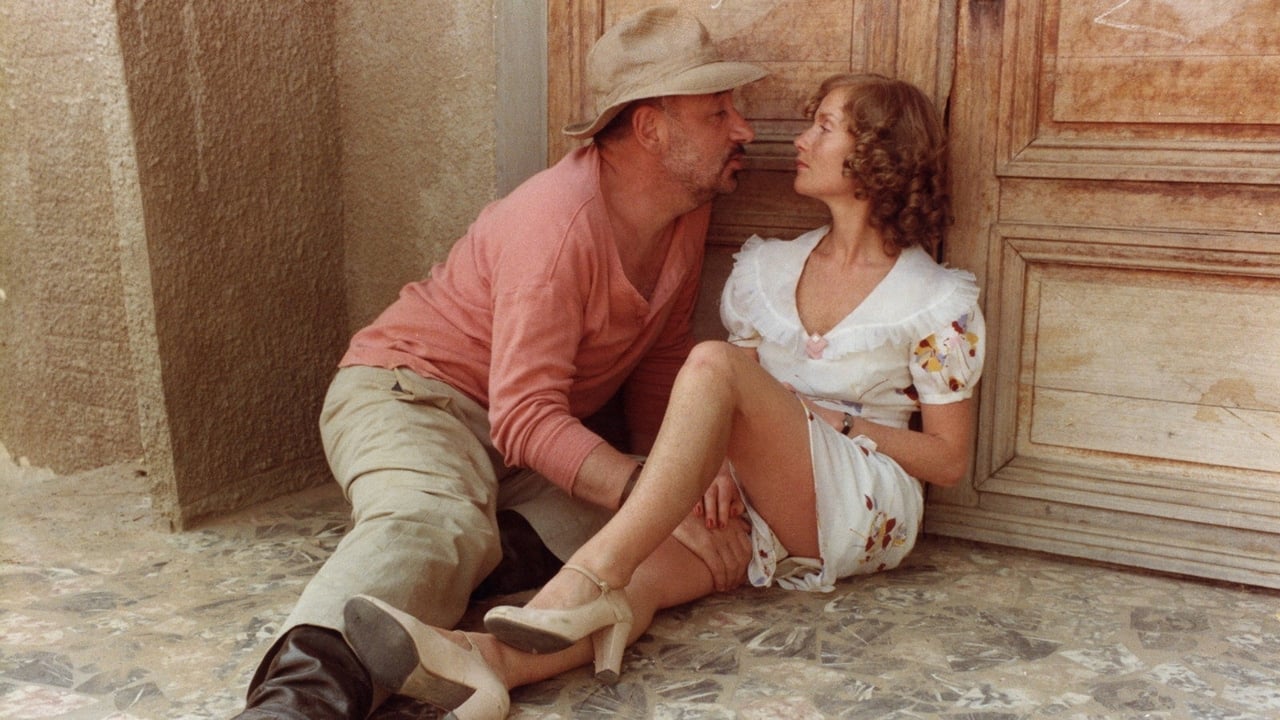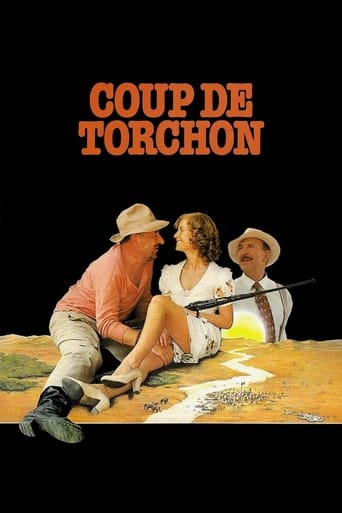Matrixston
Wow! Such a good movie.
Tyreece Hulme
One of the best movies of the year! Incredible from the beginning to the end.
Stephanie
There is, somehow, an interesting story here, as well as some good acting. There are also some good scenes
Cassandra
Story: It's very simple but honestly that is fine.
morrison-dylan-fan
Despite seeing his name mentioned in connection with French cinema for a number of years,I've never had the chance to see a work from auteur Bertrand Tavernier. Getting set for a poll on the best films of 1981 on ICM,I took a look at French movies from the year,and was thrilled to spot to see Tavernier take on Jim Thompson!,which led to me flying the coup.The plot:1938-A French colony in West Africa.Being one of the few "symbols" of law and order in the colony,police officer Lucien Cordier shows a disregard for the powers which matches the state of his personal life,where his wife Huguette has invited a "fake brother"/lover round to live with them,and Cordier himself tries starting an affair up with Rose Mercaillou. Treating black people as lower than dirt, Cordier overlooks any misdeeds with the mere fistful of a bribe. Annoyed at two pimps questioning his power,Cordier asks for advice from fellow officer Marcel Chavasson,who tells him to "act forcibly" which leads to Cordier using a bit too much force in the colony. View on the film:Appearing in Cordier's life like a flower in the desert, Isabelle Huppert gives an impeccable performance as Rose Mercaillou,with Huppert giving Rose pointed petals which get burnt by the simmering Noir frustrations of Cordier. Keeping her other lover secret, Stéphane Audran gives a great, consistently changing performance as Huguette Cordier,whose flirting with the toyboy Audran turns to stone at the mere whiff of her husband Lucien. Stomping round the colony like a crusty warthog, Philippe Noiret gives a magnificent performance as Lucien Cordier. Wanting to do as little work as possible,Noiret gives Cordier an unsettling casual attitude to fights on the street,and signs of annoyance at even the suggestion of helping out black people in the colony. Taking officer Chavasson's advice, Noiret sands down to the Neo-Noir veins of Cordier,that are pulled with a friction over Cordier overstepping in the land.Dissecting the original US setting for a French African colony,co- writer/(with Jean Aurenche) director Bertrand Tavernier & cinematographer Pierre-William Glenn retain the Noir roots with a blistering evil under the sun atmosphere, that makes the sights of the local mob and Cordier gunning his own brand of justice clear to see,in the cold light of day.Shot on location, Tavernier seeps the Noir mood with the grit and dry blood of the colony in elegantly held tracking shots following Cordier's descent into vicious contempt.Moving from the Deep South of Thompson's book,the screenplay by Bertrand Tavernier and Jim Thompson takes the racism over to deepest West Africa,where the horrific treatment Cordier and the whites lash out cover the screen in Noir vile. Filling Cordier's hands with dirty money that gets him to turn a blind eye,the writers brilliantly chip away at Cordier way of life and unveil a nihilism that Cordier is unable to drop back into the water and hide from the colony pop 1280.
Aristides-2
As happens on occasion with subtitled foreign films I become confused and perplexed at what appears to be the discrepancy between what the characters are doing and/or involved with and what the subtitles have them saying. Such was the case in spades with Coup de Torchon. In this instance the result was to make the characters, particularly the main one, even less accessible as far as trying to understand why they/he did what they were shown doing. I gave this movie 2 stars because of this disembodiment. *I was told some time ago that if a foreign film (or an English speaking one) is not wildly popular when first released, but has something appealing that a distributor thinks might make a few bucks then, in some cases, the bottom line rule gets applied and the subtitling job goes out for bids to companies that don't apply standards that are usually applied to movies with more popular pedigree. Such might be the case with 'Coup de Torchon'.
Michael Neumann
Bertrand Tavernier once again shows why he's one of his country's most challenging directors with this disturbing dark comedy, loosely adapted from a Jim Thompson novel ('POP 1280') but relocated to French Equatorial Africa just before World War II. The story follows a lazy, ineffective police chief in a dusty colonial city, who begins to manipulate his tormentors in much the same way they earlier abused him, discovering along the way the omnipotence of his position and the immunity provided by his reputation as an incompetent buffoon. After suffering the indignities of a natural born doormat all his life, he strikes back with a vengeance, slowly descending into a rational madness that commands sympathy while simultaneously provoking moral outrage (at one point he callously murders the innocent native servant who mistakenly witnessed on of his killings). Tavernier builds the tension from his characters rather than from the plot, using touches of unsettling black humor to further blur the line dividing comedy and tragedy.
Spleen
One of those films that's known, if at all, entirely because of its amusing title, is something listed on the IMDb as "Zeisters" but alternately titled "Fat Guy Goes Nutzoid". One suspects the alternate title is apt, too, because there's probably not a lot more to that film than a fat guy going nutzoid. "Clean Slate" could also be called, with about as little oversimplification, "Doormat Goes Nutzoid". The first part of the film sees Bertrand Tavernier, helped along by Pilippe Noiret's broad acting and more co-operation than was strictly necessary from the rest of the cast and crew, establish again and again and again that Lucien is a doormat. In a typical scene two people who are of little account themselves will take turns tripping him so that he sprawls in the dust, only to watch him get up and apologise for falling over. It's like watching George McFly from "Back to the Future".Then, in the latter and believe it or not better part of the film, Tavernier and Noiret slam on the brakes, skid 180 degrees and show us Lucien going nutzoid, killing off whoever gets or has gotten in his way, safe from suspicion because of his established persona. The film ends when it ends.I saw a 16mm print which did little for what I suspected was nice, crisp location photography, but it was clear enough Tavernier was trying (with success) to make the remote and somewhat neglected African village look like a bare stage; which, along with the hints of pervasive colonial corruption, was necessary to allow such a piece of conceptual art as "Doormat Goes Nutzoid" to come to life. Necessary, but not sufficient.

